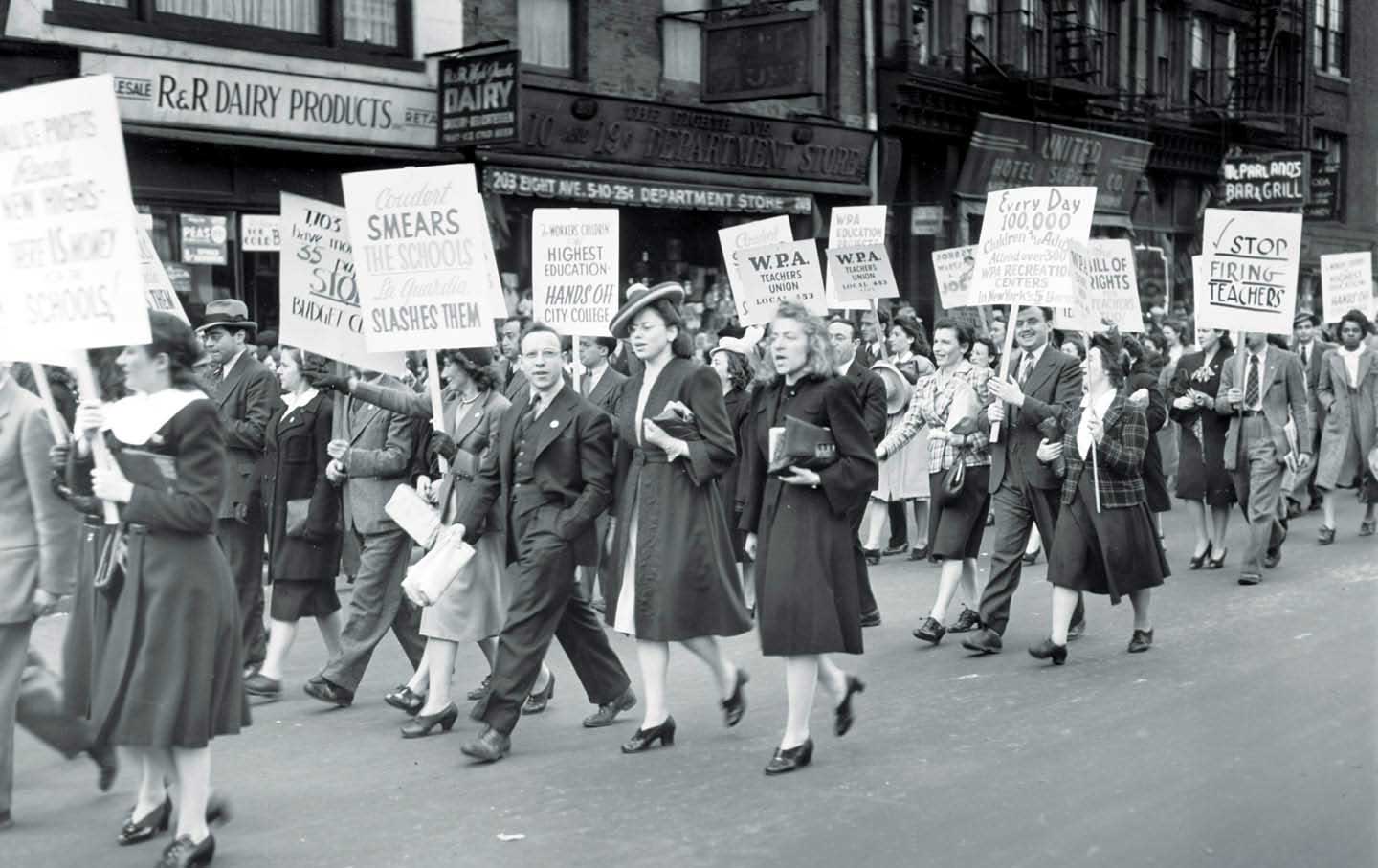I Went to the Free Press Party for Under-30s. All I Got Was Ennui.
I Went to the “Free Press” Party for Under-30s. All I Got Was Ennui.
At Bari Weiss’s “Cheers to the Republic” mixer, I met anti-vaxxers, was recruited for a trip to Israel, and heard the word “heterodox” more than I would have liked to.

Controversial former NYT columnist Bari Weiss walks backstage at The Theatre at Ace Hotel.
(Francine Orr / Los Angeles Times / Getty Images)
The news broke in early July: Bari Weiss’s Substack-born provocateur blog, The Free Press, had made it good.
The site—best known for anti-trans fearmongering, podcasts like The Witch Trials of J.K. Rowling, and a steady stream of pro-Israel thinkpieces—brands itself as America’s true down-the-middle, free speech publication. It will likely sell for over $250 million, to the parent company of CBS, Skydance. The Free Press is heterodox. The Free Press is contrarian. The Free Press wants you to know that, even while it’s taking a majoritarian line, it’s doing so in a subversive, funny, and youthful way.
As of late, writers for The Free Press, many of whom are in their 20s, have taken it as a matter of grave political concern how or if young Americans party—the party being another great institution the overserious left has apparently destroyed. To that end, their newest venture is a series of meetups—a “legendary night” for under-30 subscribers!—living in DC and New York. The silent majority would like to stake its claim on having a nice night out.
I wanted to see what it was all about. On a recent Tuesday night, I showed up at a West Village bar for The Free Press’s first installation of “Cheers to the Republic” in New York City. Chappell Roan’s “Pink Pony Club,” a song about dancing in a gay bar in West Hollywood, blasted overhead as I pushed through the throng. Young men coming from their offices dressed mostly in suits or business casual, while women wore the sort of country club attire that would make the first cycle of neoconservatives proud.
“Welcome to the official Free Press fundraiser for Zohran Mamdani!” Gen-Z reporter Maya Sulkin announced jokingly. The room chuckled politely. Here, in the free marketplace of ideas, was an implicit agreement: Screw that guy. Sulkin spoke as if waiting for someone to spring up on a chair and disagree with her, as she felt students did all throughout her college years at Columbia University, where she felt alienated for questioning phrases like “Defund the police!,” “Free Palestine!,” and “Believe all women!” Here, though, she found no debate: This party was a celebration of “the greatest—yes, the greatest—country on Earth,” and as she later wrote, it was the best night of her life. This night was all about being young and being fun, just like The Free Press fashions itself. With such a glut of Gen-Z staffers, Sulkin said, “my new editor is going to be a Labubu.”
“We are all part of the mission,” Sulkin informed the crowd. “Most importantly, just meet each other, your future ex-boyfriend, husband, non-ethical, non-monogamous…person is in the room tonight. These are really the best New York has to offer.”
What, exactly is this mission? Per a set of posters wheatpasted up around New York last month, The Free Press stands for all proud Americans, from “techno optimists” to “reactionary homesteaders.” My impression of the mission after spending a night at this party landed somewhere between lots of buzzwords, restoring liberalism, and making America great again.
One of the first people I met on my big night out was a sweet, overeager Cornell communications student who took the train down to the city to catch a glimpse of, or maybe even meet, Bari’s Gen-Z staffers, most of whom have taken to becoming influencers of a sort, livestreaming themselves recording podcasts and reading news summaries on the Free Press Instagram account. I met the friendly daughter of a landlord, who clarified to me that she doesn’t just work for her father. A young writer for the conservative Jewish magazine Tablet said she feels constrained by her publication’s voice, but that she would be thrilled to work for The Free Press.
If nothing else, that career pivot would get her more clicks. Thus far, The Free Press, which has grown far beyond its newsletter-only format, has put together a slick social media operation since its 2021 launch, mixing reels on parenting and partying today with more “serious” fare: a video titled “Is the U.S. preventing Israel from winning?,” an interview with chain-saw-wielding CPAC stalwart Javier Milei, and an uncritical repetition of conspiracy theories about FEMA hiding aid from the hurricane-struck people of North Carolina, to name a few.
The Free Press is remarkably venture-capital-backed for a “heterodox” underdog. Nonetheless, at Cheers to the Republic, they didn’t seem to spend much on decorations, beyond providing a merch table and a few American flags scattered in booths at the back of Sevilla Restaurant and Bar. On most nights, it’s a waiters-in-bow-ties kind of establishment; on this night, it was littered with pizza boxes.
I quickly learned that Free Press fans came from near and far to partake. Rav Arora, an anti-vax podcaster and self-styled cancel-culture victim who flew in from Canada, called this dimly lit bar part of a “Dionysian revival of partying” in a Substack post after the event. While the bartenders poured the drinks more than generously—two were included with each ticket, and Sevilla’s sangria is deservedly well-reviewed—I didn’t find the mood intoxicating. But I soldiered on, and ducked into a booth for pizza and temporary Free Press tattoos. There I met a young woman who said I absolutely had to come to Israel soon. After a bit more chatter she proudly told me that she had volunteered to help a (non-Jewish) student sue the New School for antisemitism after campus protesters allegedly prohibited him from going to class. The student encampment she’d seen was “just not something that should belong in the 21st century.”
“Did you hear about what happened at Cooper Union, where the Jews got attacked, and they realized they should hide in the attic?” she asked me, and later clarified that by “attic” she meant “library.” (After false claims that Jewish students were forced to barricade themselves inside the Cooper Union library during a protest in late October 2023 went viral, the New York Police Department issued a statement saying those students were not in danger, the doors were unlocked, and that they were under police protection the entire time.) What had happened at The New School was an attack, too, my new acquaintance said: “They were banging on the door to get in, because we were having an event with an IDF soldier.”
During that time, “The Free Press kept me sane,” she told me. The protests scared her, and reporter Suzy Weiss and her team provided relief.
“It’s good to see someone reporting the truth,” said a blonde friend of hers about The Free Press, adding that outlets like The New York Times were too far left, while The Free Press, she said, is “honest” about famine in Gaza.
Attempts to debunk any and all reports that Israel is starving Palestinians occupy no less than a half dozen recent Free Press think pieces. The latest, published June 18, takes aim at NPR and CNN for publishing photos of clearly starving children without also emphasizing those children’s preexisting health conditions, such as cerebral palsy, joint pain, a head injury from Israeli shelling, and rickets, a disease caused by severe malnutrition—as if sick and injured children do not also require food to survive.
Popular
“swipe left below to view more authors”Swipe →A Brad Lander–supporting tech worker who looked like he’d come straight from Burning Man told me he was looking for a good argument, but hadn’t been able to find one yet. He found a lot of people saying “heterodox,” a lot of people saying “nuance,” but mostly, they quietly agreed with each other. Even Mr. Burning Man couldn’t stand Mamdani.
At the cusp of a possible Skydance sale, The Free Press faces a challenge: It is difficult to position yourself as the voice of the sensible unheard when the “anti-wokeness” your publication feeds on is unequivocally in power. As officers from unknown agencies and the National Guard set up checkpoints in DC and ICE abducts children from their schools, The Free Press asks us to preserve our free speech by stepping back, chilling out, and learning how to party. As children go hungry in Gaza, The Free Press asks us to consider whether those children in Gaza “might have been sick or worse even if there was no war.” To paraphrase Adorno: The Free Press offers itself as a device for orientation in a cold, alienated, largely incomprehensible world. It is a device for casting oneself as reasonable: Gays (like Bari Weiss) are fine, sure, but maybe those claims of malicious Midwestern doctors force-transing children are worth interrogating. Democrats are fine, sure, but that Zohran Mamdani made a rap song once.
It’s easy to get swept up in the comfort of the scroll. It’s harder, though, to reckon with the effects of The Free Press’s “just-asking-questions” milieu in the real world. The Missouri anti-trans crusader who was shot to fame thanks to the outlet’s promotion successfully got the one clinic for transgender youth in St. Louis shut down. Now, she tours the US pushing to roll back healthcare for trans people nationwide. Meanwhile, Christopher Rufo, a Free Press writer who is also almost single-handedly responsible for the right-wing panic over “critical race theory,” says the publication he works for does a fabulous job helping him “radicalize American elites and to create a kind of defector class.” “Among those kind of likely converts, I think you’d find a lot of people who have read The Free Press,” Rufo told The New York Times last year.
All parties have to end, but maybe not quite as early as this one did: The Free Press fete cleared out by midnight. On the sidewalk outside, a drunk girl touched my hair and asked if its volume indicated that I might be Jewish.
I told her to take a guess. At this party, it was OK to make assumptions.
Take a stand against Trump and support The Nation!
In this moment of crisis, we need a unified, progressive opposition to Donald Trump.
We’re starting to see one take shape in the streets and at ballot boxes across the country: from New York City mayoral candidate Zohran Mamdani’s campaign focused on affordability, to communities protecting their neighbors from ICE, to the senators opposing arms shipments to Israel.
The Democratic Party has an urgent choice to make: Will it embrace a politics that is principled and popular, or will it continue to insist on losing elections with the out-of-touch elites and consultants that got us here?
At The Nation, we know which side we’re on. Every day, we make the case for a more democratic and equal world by championing progressive leaders, lifting up movements fighting for justice, and exposing the oligarchs and corporations profiting at the expense of us all. Our independent journalism informs and empowers progressives across the country and helps bring this politics to new readers ready to join the fight.
We need your help to continue this work. Will you donate to support The Nation’s independent journalism? Every contribution goes to our award-winning reporting, analysis, and commentary.
Thank you for helping us take on Trump and build the just society we know is possible.
Sincerely,
Bhaskar Sunkara
President, The Nation
More from The Nation

Letter From DC: Goodbye to John Wall, Hello to Celebrating His Rebel Spirit Letter From DC: Goodbye to John Wall, Hello to Celebrating His Rebel Spirit
The former Washington Wizards point guard retires from the NBA, but the anti-Trump protests embody his swaggy defiance.

A Losing “Argument” A Losing “Argument”
The buzzy new publication devoted to “libbing out” reprises the mistakes of the longstanding alliance between neoliberalism and Beltway journalism.

Trump’s War on Higher Ed Comes to the Bargaining Table Trump’s War on Higher Ed Comes to the Bargaining Table
As two of the nation’s largest private graduate student unions fight for new contracts, their members have been among the most vulnerable to the president’s attacks on universitie...

MAGA Conservatives Are Terrified of the Future MAGA Conservatives Are Terrified of the Future
Trump and his followers don’t just want to halt progress. They want to turn back the clock.

As Federal Support Wanes, States Must Reinvest in Higher Education As Federal Support Wanes, States Must Reinvest in Higher Education
Our education system faces a crisis of affordability and access only amplified by the passage of the Big, Beautiful Bill and Trump’s attempted cuts. States need to step up.

Eric Foner’s Personal History Eric Foner’s Personal History
Reflecting on his decades-long career, the historian considers what his field of study owes to the public.


